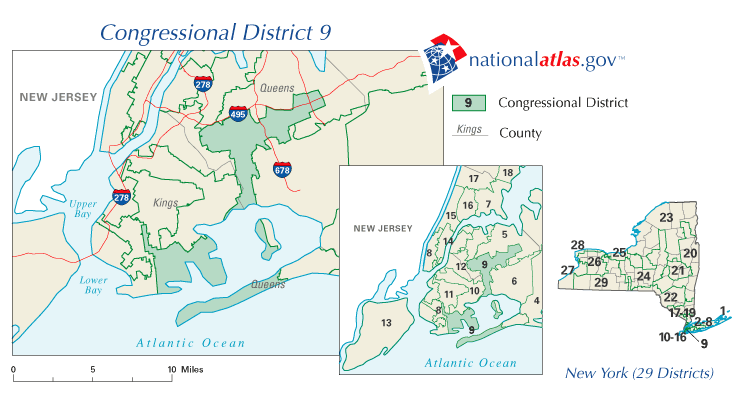
The legislative session in Albany ends on June 20, and one important aspect has yet to be resolved: redistricting. Without legislative action, political power within the state could become further consolidated, warn proponents of independent redistricting reform.
Based on 2010 Census results, New York will lose two congressional seats. Political analysts speculate that with Republicans holding the state Senate and Democrats holding the state Assembly, a compromise will be reached so that each party loses a seat.
One compelling seat the Democrats may agree to give up is the ninth congressional district, held by scandal-ridden Congressman Anthony Weiner (D-Kew Gardens). Eliminating his seat could solidify surrounding Democrats’ power as they carve out sections of his district, analysts said.
Many politicians campaigned against this type of political maneuvering during redistricting—divisively known as gerrymandering—during the 2010 election season. Leading the charge was former city Mayor Ed Koch and his group New York Uprising.
NY Uprising called on politicians to follow through on three promises: non-partisan, independent redistricting reform, ethics reform and responsible budgeting. Those who agreed to Koch’s terms were called “heroes” while legislators against Koch’s principles were labeled “enemies.”
Albany has followed through on certain aspects of responsible budgeting and ethics reform—a comprehensive ethics reform bill was passed by the Assembly and Senate on Monday—but independent redistricting has not had the same level of success.
Cuomo and Senator Michael Gianaris (D-Astoria) have both proposed redistricting reform bills, but the bills have been buried in the Senate’s calendar. With the legislative session ending on June 20, time is running out.
“Now it is time to discover who is a genuine hero of reform and who was just spouting empty campaign rhetoric,” said Gianaris. “Either my redistricting reform proposal or Governor Cuomo’s bill would be a major step forward toward reforming our elections and making our democracy more fair. … It’s time for pledges made to become promises kept.”
State Assemblyman Mike Miller (D-Woodhaven), a co-sponsor of the reform bill, said redistricting is a vital issue that constituents should know about.
“As it stands right now, representative districts are drawn in ways that do not reflect the communities they are supposed to represent but rather reflect a political agenda,” Miller said. “The proposal I have co-sponsored in the Assembly would set up a commission … which would create an independent redistricting body. This proposal will ensure transparency and good government, something we can all get behind.”
Under current state laws, the New York State Legislative Task Force on Demographic Research and Reapportionment—a group made up mostly of legislators appointed by their party leadership—create the new district maps. The State Assembly, Senate and the governor each hold veto power over the new lines, and if an agreement isn’t reached, the state courts are tasked with redrawing the districts.
Legislators stress that redistricting isn’t a boring political issue—it has real-world impacts on communities. State Senator Joe Addabbo (D-Howard Beach), a co-sponsor of Gianaris’s bill, said that neighborhoods and communities that should be within one representative district were often divided because of gerrymandering.
“I have people coming up to me from Lindenwood asking why I’m not on the ballot,” Addabbo said. Lindenwood, a small neighborhood within Howard Beach, is represented by State Senator Shirley Huntley (D-Jamaica). Howard Beach is represented by Addabbo.
The strange “carving out” of Lindenwood occurred because Republicans feared a strong Democratic base in the neighborhood, Addabbo said. “You can make [similar] cases through many areas throughout the state where there is gerrymandering to accommodate a certain party or ethnic group.”
Now, neighborhoods’ in Weiner’s district could meet a similar fate.
After admitting to a sexting scandal, Weiner’s power is fading, and Democrats are eying his district greedily. Political analyst and polling expert Nate Silver, who runs the blog FiveThirtyEight for the New York Times, writes that Weiner’s ninth congressional district has become more conservative since 2000, and eliminating the district could solidify Democrats’ power—Silver reports that in 2000, 67 percent of the district voted for Al Gore, but in 2008, only 55 percent voted for President Barak Obama.
“If [the Democrats] must lose a seat, the Ninth might be an attractive option for Democrats, both because it is the only one they now hold in Brooklyn or Queens that would be vulnerable with a poor Democratic candidate or in a strong Republican year,” Silver wrote.
Under this sort of agreement, neighboring US Representatives could divide Weiner’s district to suit their demographic needs. But this scenario may remain a dream for Democratic strategists.
If an independent redistricting reform bill does not pass, Cuomo has indicated he would veto redistricting lines drawn under the existing process, Adam Riff of NY Uprising told The Forum in an e-mail. That would give the courts the power to redistrict, rendering any back-room deals negotiated between legislators moot.
“We prefer a legislative solution, but a court-drawn independent map would be much better than a legislatively drawn map,” Riff said.
Miller agreed that the discussion of Weiner’s district is premature, and he said eliminating the district could be harmful to its residents.
“Everything we’ve all heard so far is speculation. When the lines are drawn we will see what will happen to that district, but as of right now I have heard no substantial claim that this district will change,” Miller said. “Changing the district in any major way would not be in the best interest of the people.”
by Eric Yun
